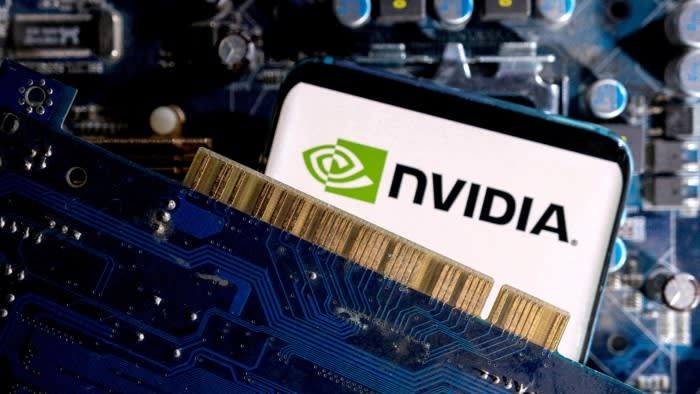Nvidia earnings now rival US jobs report for impact on markets

Access the Editor's Digest at no cost
Roula Khalaf, the person in charge of the FT, chooses her best stories for this newsletter that comes out every week.
According to analysts, Nvidia's earnings report is now just as crucial for the US stock markets as important economic data. The chipmaker is getting ready to release their quarterly results, giving investors the opportunity to assess how well the artificial intelligence industry is doing.
The S&P 500 index dropped by 0.1 percent and the Nasdaq Composite index, which is focused on technology companies, fell by 0.4 percent on Wednesday. This was before the company's second-quarter results, which were scheduled to be released after the market closed. In contrast, the Stoxx Europe 600 index rose by 0.6 percent.
Nvidia's stock price has skyrocketed by 160% this year due to increased investment in AI technology, which is driven by their chips. With a market value of $3.1 trillion, Nvidia is now second only to Apple. The company makes up approximately 6% of the S&P 500 index and has contributed to over a quarter of the index's 18% growth this year.
According to analysts at Deutsche Bank, Nvidia has become a significant event on the macro calendar, with recent results causing market reactions comparable to those seen after unexpected US jobs reports or consumer price index releases.
The bank pointed out that the S&P increased by 2.1% the day following Nvidia's results in February, marking its second-highest daily performance of the year. The S&P 500 finished slightly higher on Tuesday, nearing its all-time high.
A financial manager mentioned that he couldn't remember a time when corporate earnings were so eagerly anticipated. He believed that the stock price would most likely show a significant reaction later in the day.
Dan Ives, an analyst at Wedbush, stated in a message to clients on Wednesday that he considers this to be the most crucial earnings report for the stock market this year, and possibly even in several years.
At the beginning of the month, global markets were shaken when the US jobs data came in lower than expected, causing significant drops in US stock markets.
Morningstar's equity strategist, Michael Field, mentioned that Nvidia's earnings may have a significant impact on the market. He noted that the current period is uncertain, as there was a sell-off in August and although the market has mostly bounced back, the volatility index (Vix) remains high.
The outcomes of the company will affect other technology stocks because Nvidia has become the leading indicator of a trend in artificial intelligence that has increased the market value of prominent US companies like Apple and Microsoft.
According to JPMorgan analyst Nikolaos Panigirtzoglou, retail investors show strong optimism towards technology stocks, whereas hedge funds and mutual funds that actively trade in equities are more hesitant about investing in US tech companies.
Before Nvidia released their report, shares in one of their major distributors, Super Micro Computer, dropped by as much as 24 percent on Wednesday due to the company's announcement of a delay in their latest annual report. This decision came after receiving negative comments from well-known short seller Hindenburg Research on Tuesday.
Super Micro stated that their management needs more time to finish evaluating their internal controls over financial reporting.
The company has not reacted to the accusations made by Hindenburg, who alleged that Super Micro is dealing with important problems related to accounting, governance, and compliance. Hindenburg also stated that Super Micro is providing a lower-quality product and service that is gradually losing ground to more reliable competitors.
When Nvidia shares its newest financial figures, experts anticipate it will announce $28.7 billion in revenue for the quarter, showing a 100% increase compared to last year.
However, the American chip manufacturer is being asked about the accuracy of the delays in releasing their new Blackwell chips. Investors are also concerned that customers may reduce their purchases of AI-related chips.
In May, Nvidia informed shareholders to anticipate a substantial increase in revenue from Blackwell, a new product that is expected to be twice as effective in training AI models compared to their current chips.
At the beginning of this month, it was revealed that difficulties in production may cause certain versions of the Blackwell product line to be delivered up to three months later than expected.
Nvidia stated that Blackwell was progressing well and is expected to start mass production in the latter part of 2024. Demand for its predecessor, Hopper, continued to be high.
According to a note from analysts at Morgan Stanley on Monday, investors have believed the company's promises up to this point and have mostly disregarded worries about delays.
"The analysts added that the only downside is that investor expectations are increasing."
More information provided by Tim Bradshaw









































